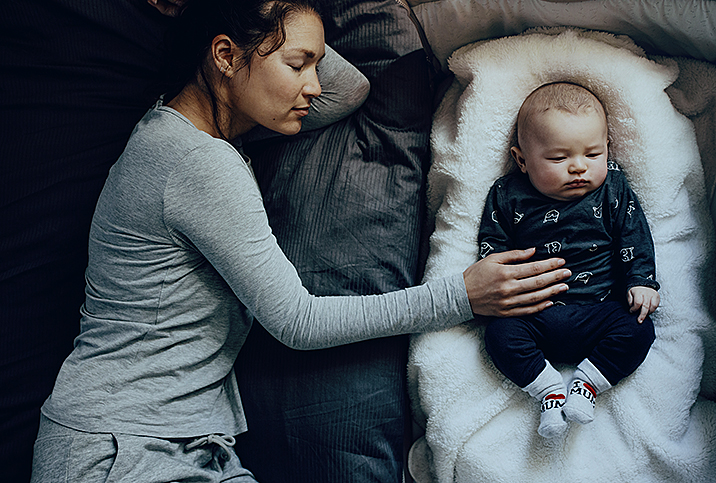Me, You and Baby in the Middle

Editor's note: Some sources for this article requested their full names not be used.
Sharing a bed with your baby has long been a polarizing practice in the world of parenting. Despite its controversiality, studies indicate that from 1993 through 2015, co-sleeping's popularity in the United States went from 6 percent to about 24 percent.
Finding time for sex as a new parent is challenging, particularly for parents who choose to co-sleep with their baby. Adding another little body to the bed creates an inconvenient environment for intimacy, and without setting intentions, co-sleeping can put a child-size dent in a couple's sex life.
For first-time mom Kate, a shop manager in Savannah, Georgia, in her late 30s, co-sleeping wasn't a conscious choice.
"Around nine months, the baby had a nasty respiratory virus and we put him in the bed with us to monitor his breathing," she explained. "After a few nights of co-sleeping, he no longer wanted to sleep through the night in his crib."
Kate's husband is not partial to the Ferber method, also known as the cry-it-out method of sleep training, and would rather sleep with their son to keep him comfortable. Now, at 14 months, the baby sleeps in the guest room with one of his parents every night, as their bed doesn't comfortably sleep three.
"I have very mixed feelings about co-sleeping," Kate said. "I would much rather he sleep through the night in his own crib."
The couple's differing opinions of bed-sharing could possibly have a subconscious effect on whether they want to be intimate with each other. Making a decision about bed-sharing based on circumstance, rather than on a collective and preemptive plan, may cause a subtle disconnection between partners.
This missed opportunity for communication may affect marital relationships differently depending on whether bed-sharing is an intentional choice or a reactive choice, according to a 2021 Greek review of literature. The review found that most commonly, though, the quality of sleep during bed-sharing influences a couple's sex life stagnancy. It's hard to feel sexy when you're working with one hour of sleep, after all.
"It is not a question of attraction, but purely exhaustion that keeps me from feeling sexual," Kate said, adding that whoever sleeps with the baby on a particular night gets less sleep and spends the next day completely drained of energy.
Exhaustion zaps more than the baby does
Melissa Thoen, L.C.S.W., the clinical director at the Ackerman Institute for the Family in New York City, confirmed the commonality of Kate's experience.
"One of the greatest issues that new parents face is sleep deprivation," Thoen said. "It's very easy to fall into a pattern of allowing your baby to sleep with you when levels of exhaustion are beyond anything previously experienced."
Both a mother and a certified sex therapist, Thoen is well-acquainted with the complications of early motherhood.
"As a new parent of a 10-month-old baby, I can attest to the importance of being creative when trying to keep a healthy connection in your partnership," she said.
Thoen said co-sleeping impacts sexual spontaneity. There's a freedom and looseness to sexuality in the early stages of a relationship that can dissipate after having children. New and consuming responsibilities block out time that used to be flexible.
Danielle and Scotty, a couple from Chelsea, Michigan, chose not to co-sleep with their first daughter, now 20 months old, but still found making the space for sex difficult. Sleep deprivation was a mood killer, as they were sometimes left exhausted after getting maybe 30 minutes of sleep.
A healthy sex life with a baby in the picture
Maintaining a sex life as new parents often comes down to creative planning and finding new ways to make sex work for your and your partner's specific schedule.
"One important way of dealing with decreased volume in sex is to communicate," Thoen said. "While planning and scheduling sex doesn't sound all that sexy, many couples who co-sleep with their little ones have to do some organizing and scheduling as to when and where intimacy take[s] place."
Thoen suggested a rendezvous in another part of the apartment, a daytime work break when the child is in day care or napping, or even getting a babysitter and staying at a hotel for the weekend. It is entirely possible to adapt to new ways of intimacy that work for you and your co-parent. It just takes communication.
For those moments when you simply cannot keep your hands off each other, improvise. Danielle recounted, laughing, "There was one time when she was older that we put her in her swing and turned it around so she could sleep and we could have sex."
Parenthood ultimately complicates what once felt exciting and natural. If your choice is to co-sleep with your child, evolve to meet your circumstances, and maybe you'll find that planned sex can still be sexy.


















